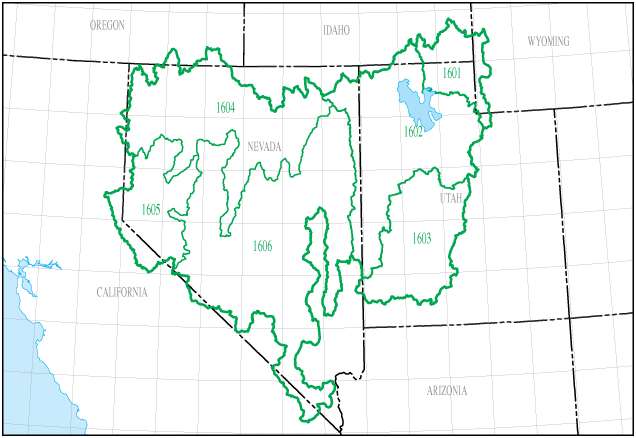Great Basin water resource region
The Great Basin water resource region is one of 21 major geographic areas, or regions, in the first level of classification used by the United States Geological Survey to divide and sub-divide the United States into successively smaller hydrologic units. These geographic areas contain either the drainage area of a major river, or the combined drainage areas of a series of rivers.[1][2]
The Great Basin region, which is listed with a 2-digit HUC code of 16, has an approximate size of 141,717 square miles (367,050 square kilometers), and consists of 6 subregions, which are listed with the 4-digit HUC codes of 1601 through 1606.[3]
This region includes the drainage of the Great Basin that discharges into the states of Utah and Nevada. Includes parts of California, Idaho, Nevada, Oregon, Utah, and Wyoming.[4]

List of water resource subregions
| Subregion HUC[5] | Subregion Name[5] | Subregion Description[4] | Subregion Location[5] | Subregion Size[5] | Subregion Map |
|---|---|---|---|---|---|
| 1601 | Bear subregion | The Bear River Basin. | Idaho, Utah, and Wyoming. | 7,310 sq mi (18,900 km2) |  HUC1601 |
| 1602 | Great Salt Lake subregion | The Great Salt Lake Basin excluding the Bear River Basin. | Idaho, Nevada, Utah, and Wyoming. | 28,700 sq mi (74,000 km2) |  HUC1602 |
| 1603 | Escalante Desert–Sevier Lake subregion | The Escalante Desert and the Sevier Lake closed basins. | Nevada and Utah. | 16,200 sq mi (42,000 km2) |  HUC1603 |
| 1604 | Black Rock Desert–Humboldt subregion | The Humboldt River Basin, the Black Rock Desert, and other closed basins that discharge into Northwestern Nevada. | California, Nevada, and Oregon. | 28,300 sq mi (73,000 km2) |  HUC1604 |
| 1605 | Central Lahontan subregion | The Central Lahontan Basin Consisting of the Carson, Truckee, and Walker River Basins. | California and Nevada. | 12,500 sq mi (32,000 km2) |  HUC1605 |
| 1606 | Central Nevada Desert Basins subregion | The Closed Desert Basins that discharge into South Central Nevada. | California and Nevada. | 47,100 sq mi (122,000 km2) |  HUC1606 |
See also
- List of rivers in the United States
- Water resource region
References
- "Science in Your Watershed - Locate Your Watershed". USGS. Retrieved 2016-10-12.

- "Hydrologic Unit Maps". USGS. Retrieved 2016-10-12.

- "Boundary Descriptions and Names of Regions, Subregions, Accounting Units and Cataloging Units". water.usgs.gov. Retrieved 2018-09-15.

- "Boundary Descriptions and Names of Regions, Subregions, Accounting Units and Cataloging Units". USGS. Retrieved 2016-10-12.

- McManamay RA, Bevelhimer MS, Kao SC, Yaxing W, Martinez-Gonzalez M, Samu N (2013). "National Hydropower Asset Assessment Environmental Attribution". USGS-Oak Ridge National Laboratory. Retrieved 2016-10-12.
